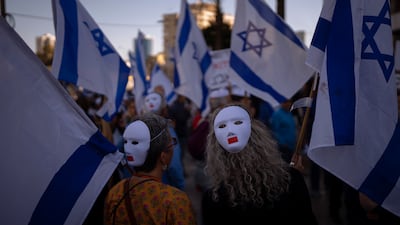Ever since the return of Israeli Prime Minister Benjamin Netanyahu at the head of the most right-wing coalition in the country’s history, politics here has felt like a steaming, bubbling pot with the heat being gradually ratcheted up beneath it, fanned by extremist posturing and sometimes even outright racist language.
Then came the legislation. The proposals contained in Mr Netanyahu’s contentious judicial overhaul bill boiled over, after weeks of demonstrations, into incendiary action on Sunday. Waves of angry protesters roiled through the streets, while a huge general strike brought most of Israel grinding to a halt.
Demonstrations against the government’s package of legislation are not new here, they have been rippling for months. But the catalyst for this unprecedented upsurge came when Mr Netanyahu dismissed Defence Minister Yoav Gallant, in apparent retaliation against his call for a pause to the controversial plans. The spontaneous, angry, fiery marches that ensued, coupled with striking workers, felt totally different to what had come before.
The breadth of the strikes we saw here on Monday is difficult to overstate; barely an aspect of life in Israel was left untouched. From the airport and major ports, to universities, shops, and even McDonald's, workers stood down. The walkout was not just confined to Israel, either – staff at Israeli embassies around the world also went on strike at the instruction of the Histadrut labour union.

The demonstrations were not solely the preserve of opponents to the bill; on Monday, for the first time, Mr Netanyahu’s supporters also took to the streets to rally in favour of the legislation. They were clearly expressing pent-up frustrations and anger that their voices weren’t being heard, some of them even hassling a few journalists covering the protests on the ground. But while their turnout was impressive, the evidence suggests that they are in the minority, despite their candidates winning a majority in last November’s election.
Recent polling from the Israel Democracy Institute indicates that a sizeable majority of Israelis simply do not want the changes to the judiciary that the government is pushing, at least in the form in which they have been written.
Finally, as the light faded and the protests threatened to escalate out of control as mobs of young men affiliated with fringe right-wing groups began roaming the streets, Mr Netanyahu addressed the nation, announcing a delay to proceedings.
It was a classic “Bibi” moment, the Prime Minister invoking King Solomon, seeming to characterise himself as the King, needing to rule over two women fighting over a precious child. He was “aware of the tensions”, and was “listening to the people”, he said. The second and third votes on the remaining legislation would be delayed until the Knesset returned from its Passover recess in April to allow “real debate”, he continued; but the embattled leader stopped well short of backing down, insisting that the overhaul remained necessary.
In among all of this came another factor that will surely alarm moderate Israelis. Earlier in the day, the far-right Jewish Power party, upon which Mr Netanyahu’s coalition is delicately balanced, revealed that the deal to delay to the legislation would involve the creation of a new so-called “National Guard” under the control of its hugely controversial leader, Itamar Ben-Gvir. Once convicted for inciting racism and supporting terrorism, Mr Ben-Gvir’s past makes him an eyebrow-raising choice for such a role, the scope of which is completely undefined. Former prime minister Ehud Barak told my CNN colleague Becky Anderson that the move was a “lunatic step”.
The question now is where this crisis goes from here. Mr Barak is among many Israelis who believe anything less than a reversal of the proposals will not be enough to end the protests. Certainly, the impression on the streets is that the unrest is far from over. Opposition leader Yair Lapid has called for the drawing up of a written constitution to plug the now gaping hole in the political system that the new legislation might expose still further. But with a pause of barely a month before the next parliamentary session, when the bills are to be debated once more, there is little time to execute such a proposal, let alone the political will – not to mention pressure from right wingers perhaps sensing it is now or never.
Meanwhile, through all of this, the man at the centre of the drama continues to dominate the discourse. There is no questioning Mr Netanyahu’s resourcefulness as a politician; his longevity and talent for improbable comebacks attest to that. Even through this latest of so many controversies, his popularity among his supporters appears undiminished. But the company he is keeping in his coalition is dragging the government to increasingly unpalatable extremes for many Israelis, as well as the country’s longstanding allies, while the perception that he himself is focused more on securing his own future than that of Israel continues to nag.
The fact that Israel went through five elections in the space of four years tells you all you need to know about the divided nature of politics here. Make no mistake, this new drama is a major crisis for this young country, the likes of which no one has seen before. The question now is whether the fractures the past few months have revealed can be healed, or whether they are symptomatic of a deeper, perhaps even inoperable malaise.


